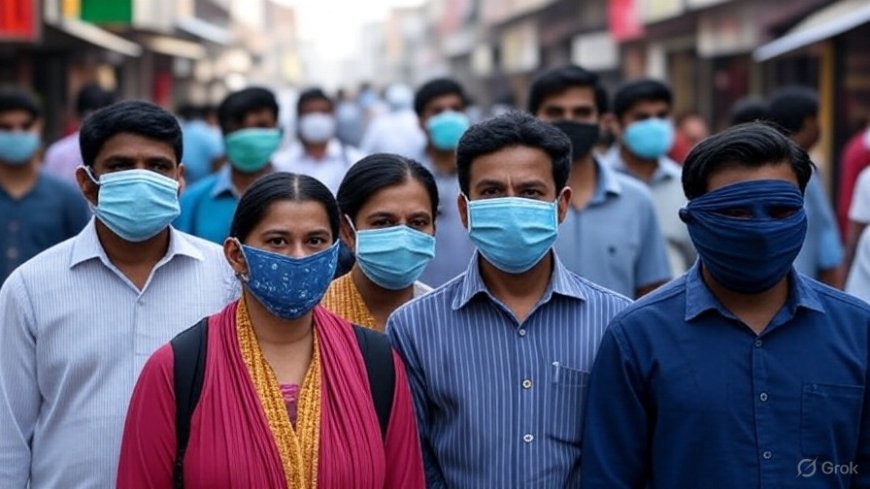India Faces Renewed COVID-19 Surge: New Variants NB.1.8.1 and LF.7 Emerge
India reports over 1,000 active COVID-19 cases as new Omicron variants NB.1.8.1 and LF.7 emerge. Health experts urge vigilance amid mild but rising infections.

India is witnessing a resurgence of COVID-19 cases, with over 1,000 active infections reported nationwide. The emergence of two new Omicron subvariants, NB.1.8.1 and LF.7, has prompted health authorities to enhance surveillance and reinforce public health measures. The Times of India+12Business Today+12India Today+12
Current Situation
According to the Ministry of Health and Family Welfare, India has recorded more than 750 new COVID-19 cases in the past week, bringing the total active caseload to over 1,000. Kerala remains the most affected state, reporting 430 active cases, followed by Maharashtra with 209 and Delhi with 105. MoneycontrolThe New Indian Express
The Indian SARS-CoV-2 Genomics Consortium (INSACOG) has identified the NB.1.8.1 variant in Tamil Nadu and the LF.7 variant in Gujarat. Both are classified by the World Health Organization as "Variants Under Monitoring," indicating that they are being closely observed but are not currently considered variants of concern. India Today+3India Today+3The Times of India+3The Times of India+2The Times of India+2Business Today+2
Symptoms and Severity
Health officials report that infections associated with these new variants generally present mild symptoms, resembling those of common viral fevers. Delhi Health Minister Pankaj Singh noted that the recent surge in the capital involves a new variant exhibiting symptoms similar to viral fever, with no significant increase in hospitalizations. Business Today+3The Economic Times+3The Times of India+3
However, experts caution that individuals with weakened immune systems may experience more severe symptoms. The variants' ability to alter T cells could potentially weaken the body's defense mechanisms, making it crucial for vulnerable populations to remain vigilant. Financial Express
Healthcare Response
In response to the uptick in cases, healthcare facilities across the country are enhancing their preparedness. Private hospitals in Kolkata have intensified screening and isolation protocols, with several institutions allocating dedicated COVID-19 wards and increasing sanitization efforts. The Times of India
Similarly, the Visakha Institute of Medical Sciences (VIMS) in Visakhapatnam has established a 20-bed COVID-19 ward and is equipped with rapid antigen test kits and necessary medications. The Times of India
Vaccination and Booster Uptake
India has administered over 2.2 billion doses of COVID-19 vaccines to date. Despite this achievement, booster dose uptake remains inconsistent, particularly among high-risk groups such as the elderly and immunocompromised individuals. Experts emphasize the importance of booster vaccinations in maintaining immunity against emerging variants. SRM Institute of Science and Technology+3India Today+3Wikipedia+3
Public Health Recommendations
Health authorities advise the public to adhere to the following precautions:
-
Mask Usage: Wear masks in crowded or enclosed spaces.
-
Hand Hygiene: Regularly wash hands with soap and water or use hand sanitizers.
-
Social Distancing: Maintain a safe distance from others, especially in public areas.
-
Vaccination: Ensure completion of the primary vaccination series and receive booster doses as recommended.
-
Stay Informed: Follow updates from official health departments and trusted news sources.
Conclusion
While the current resurgence of COVID-19 in India is characterized by mild cases, the emergence of new variants underscores the need for continued vigilance. Public adherence to health guidelines and proactive measures by healthcare institutions are vital in mitigating the spread of the virus.


















































